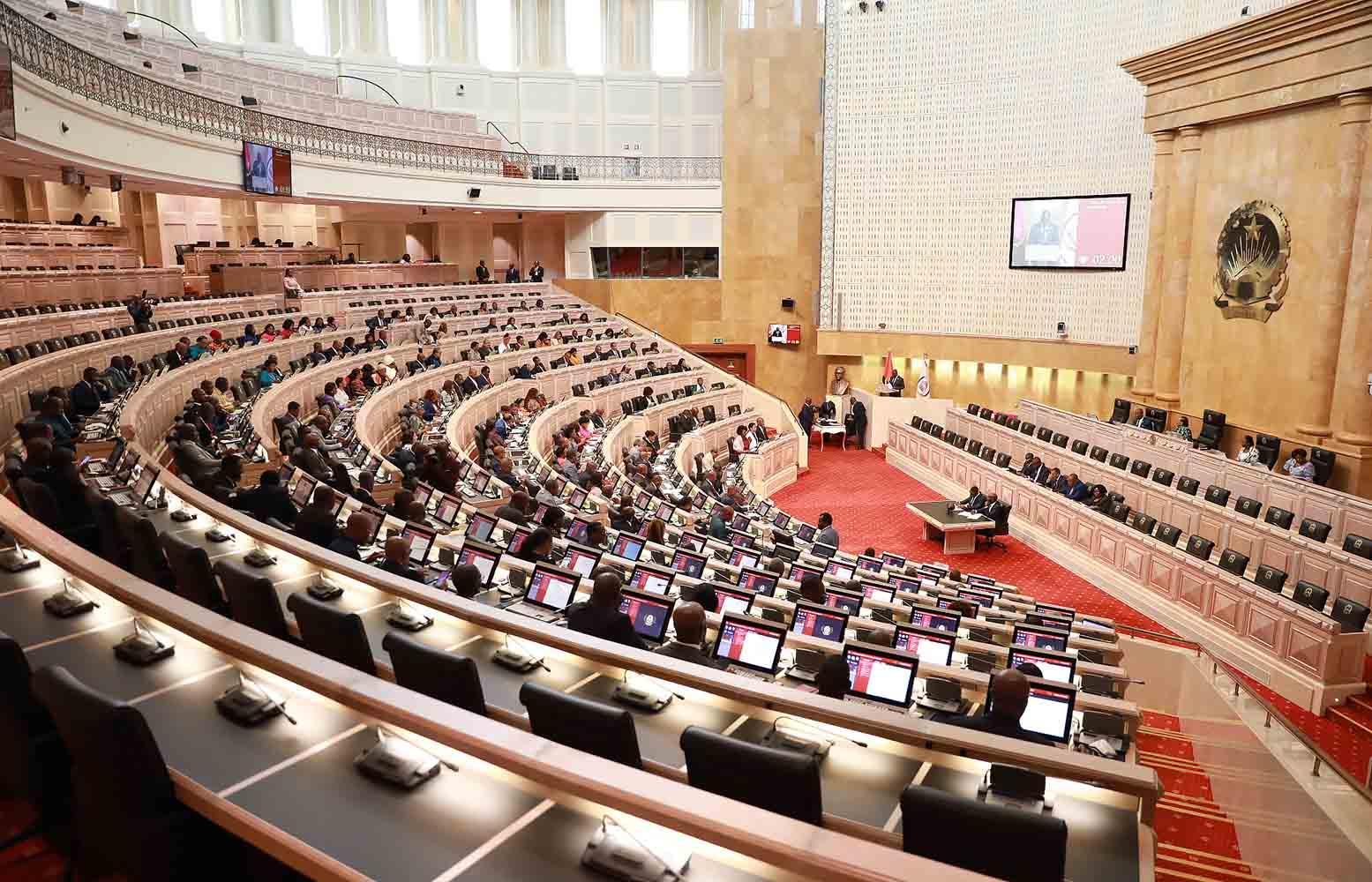Africa-Press – Angola. The Bill that amends the Angolan Penal Code, to be discussed today, by the National Assembly, in particular, and already approved in general, is opportune for the exercise of the constitutional competence in question and to safeguard essential assets or values, as well as guarantee the existence and subsistence of society, defended lawyer Veloso Malavo Issenguel, graduated in Human Rights.
In the jurist’s opinion, Law must accompany progress and social evolution, and it is in this sense that the amendment of the Angolan Penal Code, an initiative of the President of the Republic, seeks to make criminal justice in Angola more flexible and optimized towards social progress and development, seeking to adapt Criminal Law to the Angolan reality.
“Francisco de Vitória, cited by Cristina Queirós, in Fundamental Rights, as an example, left us the legacy according to which a law is only a law when it is tolerable and rational”, he highlighted, adding that, although it is new and updated the Angolan Penal Code, it is true that Angolan Criminal Law needs optimization, that is, changes in order to make it better.
The advantages of this, continued Veloso Issenguel, aim to translate, into practical life, a more adequate notion of criminal justice in the life of citizens, as they will know how to understand that, the more serious, for example, the infraction, the higher it will be the penalty according to the value of the asset protected by criminal law, which also allows us to impress on everyone’s mentality, including skeptics and critics, that criminal justice is one of the social imperatives and one of the mechanisms for organizing, guaranteeing and protecting fundamental values of today’s and tomorrow’s society.
Veloso Issenguel believes that with the Amendment of the Penal Code there is an interest in guaranteeing the security of the State and combating other infractions that plague society and that lead to regression, weakening public services in the pursuit of the common good, such as health, education, access to piped water, electricity, as well as the lack of attention to the protection of public assets, such as infrastructure, equipment of public institutions, such as hospitals, schools and public companies, which could result in greater development difficulties and social progress to the point of negatively conditioning the country’s governance.
The lawyer said he is confident that the bill will pass in the specialty and subsequently in the next plenary session of the National Assembly, not because the MPLA holds a comfortable parliamentary majority, but rather because the initiative of the President of the Republic is in the interest of all Angolans.
Justice sector review
According to the document presented at the 5th Extraordinary Plenary Meeting of the 2nd Legislative Session of the V Legislature, of the National Assembly, this initiative by the Head of State falls within the scope of the process of reviewing legislation in the Justice sector.
The diploma essentially aims to carry out an exercise of correcting and overcoming inaccuracies, mistakes and insufficiencies recorded when the recently approved Angolan Penal Code was published, with a view to ensuring a more satisfactory implementation and application of this fundamental instrument for carrying out criminal justice.
The initiative also aims to ensure compliance with the Angolan legal framework in relation to the findings of the Mutual Assessment Process of Conformity and Effectiveness of the National System for the Prevention and Repression of Money Laundering, Financing of Terrorism and the Proliferation of Weapons of Mass Destruction, to which the country was internationally subjected.
Changing penalties
According to the document, in particular, this proposal proposes to introduce a specific body of changes to several articles of the Angolan Penal Code, approved by Law no 38/20, of 11 November, in order to promote the correction of insufficiencies , errors, inaccuracies or omissions identified in this short period of validity, as well as the conformity and adequacy of the penalization panorama for certain crimes in relation to the concept of “Underlying crimes”.
If the project that proposes the change is approved by the committees, and passes to the next Plenary Meeting, one of the penalties to be changed is related to sexual abuse, where the law applies a prison sentence of six months to three years to anyone who, being older , performing sexual acts with a minor for payment or other consideration.
Other penalties also state that anyone who promotes or in any other way provides assistance to a foreign citizen to illegally enter national territory is sentenced to a prison sentence of six months to three years or a fine of 60 to 360 days.
Whoever, by himself or through an intermediary, with his consent or ratification, offers, gives or promises a material or non-material advantage to an official or person specially obliged to provide a public service, or to a third person with their knowledge, to carry out act or omission inherent to the duties of the respective position or function, is punished with a prison sentence of 6 months to 2 years or a fine of 60 to 240 days.
The proposal also states that the employee who, by himself or through an intermediary with his consent, requests or accepts, for himself or for a third party, a material or non-material advantage, or a promise thereof, to carry out an act or omission inherent to the duties position or function, even if prior to that request or acceptance, is punished with a prison sentence of 6 months to 2 years or a fine of 60 to 240 days.
If, in the case of the previous number, the act or omission is contrary to the duties of the position or function, the penalty is imprisonment of 6 months to 3 years or a fine of 60 to 360 days. Still on the proposal, it also states that the employee who, with the intention of obtaining an advantage that is not due, participates in a legal transaction that involves property interests that, in whole or in part, he fulfills, due to his position or functions, administers , supervising, defending or carrying out is punishable by a prison sentence of 6 months to 5 years.
Anti-Money Laundering Bill
Criminal lawyer Sebastião Vinte e Cinco argues that Law 5/20, of January 27th – Law on the Prevention and Combat of Money Laundering, Financing of Terrorism and the Proliferation of Weapons of Mass Destruction should, with the amendment that follows, soon, taking into account the need to comply with the recommendations of the Financial Action Group (FATF), foresee the classification of more crimes and the worsening of some penalties.
In an interview , within the scope of the proposed Law that amends the Penal Code, criminal lawyer Sebastião Vinte e Cinco clarified that the FATF, as an entity founded by the group of the world’s largest economies, that is, the seven most industrialized countries and which dominates the financial markets, since 1989, the year in which it was founded, it has been dedicated to creating legal principles and standards with the aim of preventing and combating money laundering, the financing of terrorism and the proliferation of weapons with great destructive power.
The FATF, according to the lawyer, is an intergovernmental body that, through the publication of its 40 recommendations, exerts influence on States on all continents to adopt, in their internal jurisdictions, measures to prevent and repress money laundering crimes. , terrorist financing and the proliferation of weapons of mass destruction.
Sebastião Vinte e Cinco also made it known that the influence and protagonism of the FATF, at the international level, are increasingly greater and the fact that it has as observer members institutions such as INTERPOL, the African Development Bank (AfDB), the Central Bank European, the IMF and the OECD clearly demonstrate the impact of their scope of action on global financial markets.
This fact, he continued, motivates countries like Angola, with a fragile and dependent economy, to be included to improve the performance of their banking and non-banking financial sectors, “in order to avoid the repetition of situations like the one that led Angola to stop transacting United States dollars due to suspected terrorist financing in 2015.”
This dossier, of the need to embrace and implement FATF recommendations, according to the lawyer, should have been addressed since 2015, when the Angolan banking financial system was punished.
“The fact that leading the economic team of the Government of Angola is a member of staff who led the National Bank, who met with delegations from the United States Federal Reserve, who dominates the activity of the Financial Information Unit, an institution that has always worked closely collaboration with the Central Bank, may seem decisive for the procedures to finally begin with a view to conforming domestic law with the recommendations of the FATF and other institutions influenced by this intergovernmental platform”, observed Sebastião Vinte e Cinco.
Jornal de Angola
For More News And Analysis About Angola Follow Africa-Press






